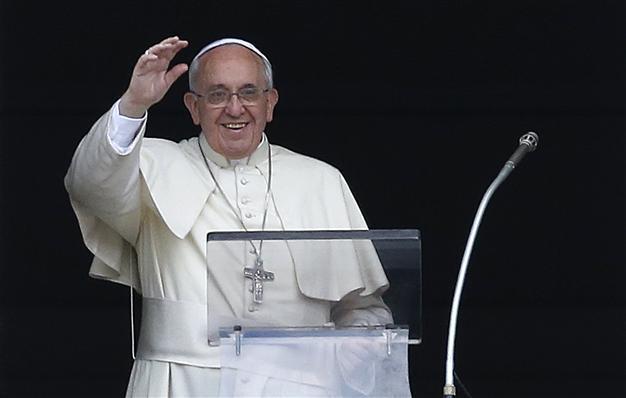Israel, Palestinians eye political gain from papal visit
JERUSALEM - Agence France-Presse

Pope Francis waves as he leads his Sunday Angelus prayer in Saint Peter's square at the Vatican May 18, 2014. REUTERS Photo
When Pope Francis arrives in the Holy Land on his "pilgrimage of prayer," Israelis and Palestinians will both be looking to use the visit to score a few political points.
Although the Vatican has said the emphasis of the pope's visit is to heal a centuries-old rift between the Catholic and Orthodox worlds, every gesture he makes is likely to come under close scrutiny by both sides.
For Israel, it will be a chance to draw world attention for something other than its ongoing settlement activity.
"The very fact of the visit is a success," an Israeli official told AFP on condition of anonymity, as the tourism ministry said it was hoping the papal pilgrimage would drive a 10 percent increase in Christian tourism.
In fact, the pope's "pilgrimage of prayer", which begins in Jordan on Saturday, will leave a relatively faint footprint in Israel.
His visit to Israel and the Palestinian territories will kick off on Sunday in the southern West Bank city of Bethlehem.
"He is taking a helicopter directly from Jordan to Palestine -- to Bethlehem. It's a kind of sign of recognising Palestine," Father Jamal Khader of the Latin patriarchate in Jerusalem told journalists.
In Bethlehem, the pope will meet Palestinian president Mahmud Abbas and then celebrate mass in front of the Church of the Nativity, traditional birthplace of Jesus, before visiting a nearby refugee camp.
"Knowing who he is, and his sensitivity for all those who suffer, I am sure that he will say something defending all those who are suffering, including the Palestinians who live under occupation," Khader said.
After a short flight to Tel Aviv's Ben Gurion airport where he will be greeted by Israeli President Shimon Peres and Prime Minister Benjamin Netanyahu, he will hold a top-level meeting with Orthodox Church leaders, before spending the night in the residence of the papal nuncio in annexed east Jerusalem.
Israel seized east Jerusalem in 1967 and calls the entire city its "united, undivided capital", in a move never recognised by the international community.
It is there that he will spend much of May 26, apart from brief forays into Israel to pay his respects at the Yad Vashem Holocaust memorial and visit Peres and Israel's two chief rabbis.
He will meet Netanyahu at the Vatican-owned Notre Dame complex, which lies on the seam line between east and west Jerusalem, for talks which will touch on politics, an Israeli official said.
"We shall be able to explain to him, from our point of view, what's happening politically in the region," he said.
"We shall explain to him the Iranian threat."
During the visit, the pope is expected to call for a peaceful resolution of the conflict with the Palestinians.
"The purpose of his visit is to encourage us not to be afraid of each other and to talk to each other and live together peacefully," Papal Nuncio Archbishop Giuseppe Lazzarotto told reporters on Sunday.
Any reference he makes to Israeli settlements, to the West Bank separation barrier, or to the question of Palestinian prisoners or refugees will be closely watched by both sides.
"Everything will be highly charged politically," said Hind Khoury, a former Palestinian minister for Jerusalem affairs.
Following the collapse of US-led peace talks last month, the Palestinians have resumed moves to seek recognition for their promised state in the international diplomatic arena and will be looking to the papal visit to provide fresh ammunition.
"This visit will help us in supporting our struggle to end the longest occupation in history," said Ziyyad Bandak, Abbas's adviser for Christian affairs.
"He will have a lunch with Palestinians, with families suffering from the occupation... then he will visit Dheishe refugee camp to witness the suffering of Palestinian refugees," he told Voice of Palestine radio.
For Israel, it was a political slight that "the pope will begin his visit in Palestine and not Israel", he claimed.
"I know that Israeli officials are not happy with this decision."
The very fact of the visit was tantamount to Vatican support for an end to Israel's occupation of the Palestinian territories, Bandak said.
"We welcome this visit and consider it as support for the Palestinian people, and confirmation from the Vatican of the need to end the occupation."
